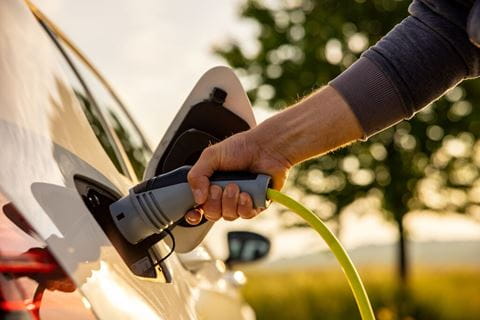Sustainability at Ayvens
Introducing our sustainability credentials
What we are doing at Ayvens Group
As a prominent player in the mobility sector, at Ayvens Group we recognise our responsibility to address climate change and contribute positively to society. That’s why we are committed to our aim of sustainable mobility.
Our Ayvens Group dedication to environmental and social responsibility is shown by our ESG ratings and numerous awards. We strive to make a lasting impact through our comprehensive sustainability strategy, which is built on four key pillars: sustainable mobility, environmental stewardship, responsible governance and social commitment.
Our Ayvens Group “Power UP 26” strategic plan includes ambitious targets to drive sustainability across our operations. We have five key goals we aim to achieve in 2026:
- Electrification
Aiming for 50% of our new car deliveries to be electric vehicles (EVs), with battery EVs (BEVs) making up 40% of this target.
- Carbon footprint reduction
Committing to reducing our overall emissions by 20% compared to our 2019 baseline, aligning with the Net-Zero 2050 climate scenario.
- Circular economy
Enhancing circularity in our maintenance and repair activities to minimise waste and promote resource efficiency.
- Responsible procurement
Ensuring that 100% of our clients and suppliers are covered under our Know Your Customer (KYC) and Know Your Supplier (KYS) assessments by 2030.
- Diversity and inclusion
Increasing the representation of women in management roles to 35%.
Science-based targets initiative (SBTi) commitment
At Ayvens Group we are proud to be a part of the Science-Based Targets initiative (SBTi), which provides companies with a clearly defined path to reduce emissions in line with the Paris Agreement goals. By adhering to these targets, we are not only reducing our carbon footprint but also driving innovation and sustainable practices within our industry. We are committed to setting and achieving science-based targets that are essential for limiting global warming to well below 2°C above pre-industrial levels. By sticking to these targets, we will not only be reducing our carbon footprint, we will be driving innovation and sustainable practices within our business.
Alignment with UN Sustainable Development Goals (SDGs)
Our Ayvens Group sustainability strategy is closely aligned with the United Nations Sustainable Development Goals (SDGs). This ensures our efforts contribute to global sustainability objectives. Here are some of the key SDGs we focus on:
SDG 7: Affordable and clean energy
Promoting the use of electric vehicles and renewable energy sources to reduce reliance on fossil fuels.
SDG 11: Sustainable cities and communities
SDG 11: Sustainable Cities and Communities: Supporting the development of sustainable urban mobility solutions that enhance the quality of life in cities.
SDG 12: Responsible consumption and production
Implementing circular economy principles in our operations to minimise waste and promote resource efficiency.
SDG 13: Climate action
Committing to significant carbon footprint reductions and supporting global efforts to combat climate change.
SDG 17: Partnerships for the goals
Collaborating with stakeholders, including clients, suppliers, and regulatory bodies, to achieve our sustainability targets.
What we are doing at Ayvens in the UK
At Ayvens in the UK, sustainability is very important to us. Our comprehensive approach aims to ensure we not only meet our environmental and social responsibilities but also drive positive change within our industry and beyond. We are proud of our achievements and remain committed to building a more sustainable future for all
Social impact in Bristol and Slough
We are deeply committed to making a positive social impact in the communities where we operate, particularly in Bristol and Slough. Our initiatives focus on enhancing the wellbeing of local residents and fostering sustainable development.



At Ayvens, sustainability is very important to us. Our comprehensive approach aims to ensure we not only meet our environmental and social responsibilities but also drive positive change within our industry and beyond. We are proud of our achievements and remain committed to building a sustainable future for all.
A focus on the circular economy
We are deeply committed to integrating circular economy principles into our operations, aiming to minimise waste and maximise resource efficiency. Here are some of our key initiatives:
Enhanced maintenance and repairs
We have implemented advanced maintenance and repair processes designed to extend the lifecycle of vehicles and parts. By focusing on refurbishing and reusing components, we reduce the need for new materials and minimise waste.
Recycling and reuse
We have established comprehensive recycling programmes for end-of-life vehicles and parts. This includes the recovery of valuable materials such as metals, plastics, and batteries, which are then reintroduced into the production cycle. These efforts not only reduce environmental impact but also support the creation of a more sustainable supply chain.
Sustainable procurement
We ensure our suppliers adhere to strict environmental standards. By working closely with suppliers to promote sustainable practices, we foster a circular economy throughout our value chain. This includes sourcing materials that are recyclable or made from recycled content, further reducing the environmental footprint.
Innovation in product
We are investing in the design and development of products that are easier to disassemble and recycle. This approach not only helps the recycling process but also encourages the use of sustainable materials from the outset. By prioritising eco-friendly design, we are paving the way for a more sustainable future.
Collaboration and partnerships
We collaborate with various stakeholders, including industry partners, research institutions, and governmental bodies, to advance circular economy practices. These partnerships help us stay at the forefront of sustainability innovations and implement best practices across our operations.
Employee engagement and training
We recognise the importance of involving our employees in sustainability efforts. Through regular training and awareness programmes, we teach our employees the principles of the circular economy and encourage them to contribute to our sustainability goals. This collective effort ensures sustainability is embedded in the company culture.
ISO 140001
We are proud to be ISO 14001 certified, demonstrating our commitment to effective environmental management. ISO 14001 is an internationally recognised standard that sets out the criteria for an environmental management system (EMS). It provides a framework for organisations to protect the environment, respond to changing environmental conditions, and enhance environmental performance.

